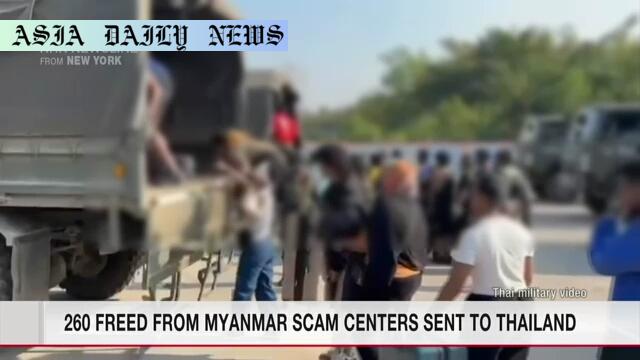Scam operations: Thailand receives 260 individuals forced into scam operations in Myanmar, including Ethiopians, Kenyans, and others.
- Thailand rescued 260 foreigners forced into scam operations in Myanmar.
- The victims hail from 19 countries, including Ethiopia, Kenya, and the Philippines.
- Thai authorities are investigating how they entered the country, involving Myanmar’s armed ethnic groups.

Foreigners Rescued from Scam Operations in Myanmar
In a significant humanitarian operation, Thailand has rescued 260 foreigners who were reportedly forced to participate in scams in Myanmar. The victims originate from 19 countries, including Taiwan. These individuals have now been safely relocated to Thailand, where authorities are conducting further investigations into their situation.
Understanding the Nationalities Involved
The large group includes a diverse range of nationalities. Among the rescued are 138 Ethiopians, 23 Kenyans, 16 Filipinos, and 15 Malaysians, alongside victims from other countries and Taiwan. The Thai Defense Ministry confirmed that the rescue effort was conducted via a crossing point at the Thai-Myanmar border, ensuring the safety of the victims.
Role of Armed Groups in Myanmar
According to Thai officials, the victims were initially detained by an armed ethnic minority group in Myanmar. This group likely exploited these individuals, forcing them to perform illegal operations as part of widespread scam networks. The Thai government is now working diligently to uncover further details about how these individuals crossed into Myanmar and their subsequent ordeal.
Scam Networks Flourishing in Myanmar Since the Coup
Since the military coup in Myanmar in 2021, several scam organizations have gained prominence, particularly close to the border with Thailand. Many of these groups are run by Chinese nationals and others, using confined and forced labor to carry out various fraudulent activities. Numerous foreigners have reported being lured to Myanmar with promises of legitimate jobs, only to find themselves trapped in these criminal enterprises.
Thailand’s Protective Measures
In this case, Thai authorities acted swiftly to ensure that the victims, who had suffered severe exploitation, found protection. The Thai government is committed to investigating the reasons behind this issue and providing necessary support for survivors. Furthermore, efforts are underway to dismantle cross-border networks that exploit vulnerable individuals.
The Global Concern of Forced Scam Labor
Forced labor involving scam operations has become a growing concern in Southeast Asia, particularly in countries facing political instability like Myanmar. Human traffickers and crime syndicates often prey on foreign job seekers with limited resources, making the issue an international challenge. Governments and organizations across the region must work together to bring these operations to an end and protect victims effectively.
Efforts for Rehabilitation and Justice
In addition to providing safety, Thailand has pledged to work on rehabilitating the victims and ensuring they receive proper medical and psychological assistance. Authorities are also preparing efforts to contact the respective embassies of the victims’ countries to arrange their repatriation. Further legal proceedings are being considered to ensure that those involved in the exploitation face justice under international law.
The Role of International Cooperation
Addressing such cross-border crimes requires robust international collaboration. Governments, non-governmental organizations, and intergovernmental bodies need to coordinate to combat human trafficking and forced labor. Sharing intelligence and enhancing border security are pivotal steps toward preventing these crimes.
A Call to Action
As the global community learns about these stories of exploitation, it serves as a reminder of the urgency to fight human trafficking and forced labor. Stronger policies, vigilant enforcement, and active participation from civil society groups are integral to ensuring justice and protection for victims. This incident also underscores the importance of addressing the root causes, including poverty, lack of opportunities, and political instability.



Commentary
The Growing Threat of Scam Operations in Distressed Regions
The incident involving 260 foreign nationals rescued from scam operations in Myanmar sheds light on the nefarious practices that have become increasingly common in regions experiencing political unrest. Myanmar, reeling from its 2021 coup, has become a hotspot for criminal networks exploiting vulnerable individuals for forced labor. This grim reality calls for immediate attention and collaborative action from international stakeholders.
An Alarming Increase in Human Exploitation
It is particularly troubling to see such a wide range of nationalities among the victims, signaling the far-reaching nature of these scams. The promise of legitimate employment has turned into a nightmare for those lured across borders. This incident underscores the need to educate populations, especially in underprivileged regions, about the risks of fraudulent job offers and the dangers of human trafficking.
The Vital Role of Thailand and Global Partners
Thailand’s efforts in rescuing and protecting these individuals are commendable and set a precedent for regional cooperation. However, this single operation is not enough. To root out such criminal networks, governments and organizations worldwide must unite to target the sources of these scams. By addressing poverty, creating economic opportunities, and stabilizing politically volatile areas, we can reduce the vulnerabilities that traffickers exploit.
A Ray of Hope
While the ordeal faced by these 260 individuals is horrifying, their rescue marks a significant step toward justice and healing. The international community must now step up to provide the support and resources necessary for their recovery and to prevent such crimes from recurring. This moment serves as both a dire warning and a critical opportunity for us to act decisively against forced labor and human exploitation.